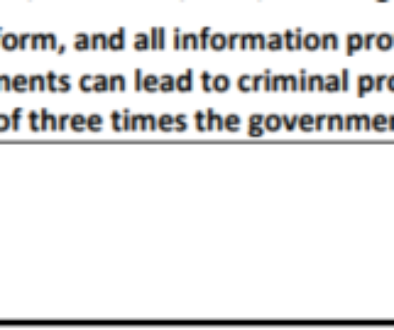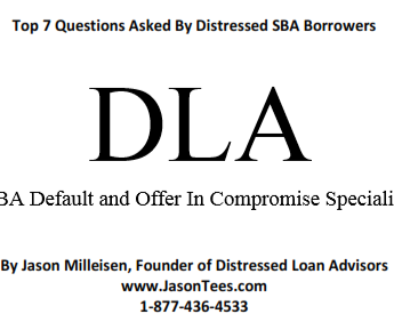I recently had a client who owed the SBA $1 Million following a short sale of his commercial real estate (it was a 504 loan). After the short sale, he got some bad advice and offered a nominal amount to settle, which was quickly rejected. After rejecting the offer, the CDC (the company that services the SBA loan) referred the file to the US Treasury for collection, and had a 28% penalty added to the loan balance. Once he was contacted by the Treasury, he reached out to me for help. Given my experience with the Treasury (i.e. they are unreasonable), I told my client that his best opportunity to settle had passed, and that working something out with the Treasury on reasonable terms would be almost impossible. My client stated that he’d be willing to pay back the full principal balance of $1 Million. Surely, the Treasury would not be so short-sighted as to turn away a borrower who wants to repay $1 Million over 12 years, right? WRONG!
When we presented our very reasonable offer to repay the principal balance in full, it was quickly rejected. Instead, the Treasury offered three options, none of which were feasible (or reasonable):
1) Pay them 50% of the loan balance in a lump sum. (Since he had to short sale the building, it’s unclear why they think this would be remotely possible.)
2) Make a large down payment, then make payments for 24 months, and revisit the balance at that time. Just to make matter worse, they also insisted that the 28% penalty would need to be repaid as well. (We quickly decided this option was no good, as there was no guarantee what would happen in 24 months.)
3) Repay the full balance over 7 years. (They couldn’t afford their building, so what reasonable person would think they could afford to pay $1.3 Million over such a short period of time.)
I don’t understand why the Treasury chooses to opt for unrealistic settlement terms. Such demanding terms might work with smaller loan amounts like $50,000, but for a $1 Million balance, the Treasury might as well save everyone the time and effort and simply not attempt to collect the debt. The cynic in me thinks that if the debt were owed to a private entity, deals would get done. But since it’s the government, there is little repercussion for having limited success. I’m sure they rationalize that the debt is with them in the first place because the borrower refused to make a deal with the CDC, and therefore they only get files that are likely to be uncollectible. What they will never admit is that their predictably minimal success when it comes to collections is due to their own short-sighted demands. To me, their settlement parameters scream “it’s not my money, and I don’t care”. How else could you explain their stance on settlements?
So what lessons can be learned from my client’s situation?
1) Trying to go it alone (or with an inexperienced advisor) early in the process can result in disaster. Following a 504 loan short sale or foreclosure, you might only have a limited window of time to settle your SBA debt. Can I guarantee that involving me will result in a settlement? No, not 100% of the time. But I’d be willing to wager that you’d have a better chance by asking for my help then by going it alone.
2) The Treasury makes unrealistic requests with regards to settlements, and the SBA will NOT be willing to step in to help.
3) With regards to settling SBA 504 debt, time is of the essence. If you are going to sit back and wait for the CDC to contact you, that is a huge mistake. If the CDC refers the file to the Treasury, you are dead in the water. You need to be proactive about settling your SBA 504 loan, which means being in constant contact with the CDC, and having an Offer In Compromise ready for submission as soon as the short sale/foreclosure is complete.
Distressed Loan Advisors (http://www.JasonTees.com) offers expert advice about dealing with SBA Loan Default and Forgiveness, and can be reached at . or..


